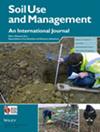Effect of cover crops and tillage systems on soil quality and sugarcane yield
IF 3.7
3区 农林科学
Q1 SOIL SCIENCE
引用次数: 0
Abstract
The management adopted in the establishment and replanting of sugarcane fields, with conventional tillage followed by fallow, is one of the main causes of soil quality degradation. In this context, the soil quality index (SQI) is an important tool to guide the use of more sustainable practices and management. This study aimed to monitor the effect of different cover crops in association with different tillage systems on sugarcane yield based on key indicators and an SQI developed using the Soil Management Assessment Framework (SMAF). The experiment was carried out on a sugarcane expansion area located in the municipality of Ibitinga, São Paulo, Brazil. The following soil physical and chemical attributes were analyzed: soil bulk density, macroaggregates, available phosphorus and potassium. Soil carbon content was also analyzed and used to calculate the SQI. Productivity over the 4 years of sugarcane cultivation was also analyzed. The use of subsoilers for soil tillage proved efficient in managing compaction by providing lower soil bulk density values in the first years of cultivation (1.59 and 1.63 g cm覆盖作物和耕作制度对土壤质量和甘蔗产量的影响
在甘蔗田的开垦和重新种植过程中,采用传统的耕作方式,然后进行休耕,这种管理方式是导致土壤质量退化的主要原因之一。在这种情况下,土壤质量指数(SQI)是指导采用更可持续的做法和管理的重要工具。本研究旨在根据关键指标和利用土壤管理评估框架(SMAF)开发的土壤质量指数,监测不同覆盖作物与不同耕作制度相结合对甘蔗产量的影响。实验在巴西圣保罗伊比廷加市的甘蔗种植区进行。对以下土壤物理和化学属性进行了分析:土壤容重、大颗粒、可利用的磷和钾。此外,还分析了土壤碳含量,并用于计算 SQI。此外,还分析了甘蔗种植 4 年来的产量。事实证明,使用潜耕机进行土壤耕作能有效控制土壤板结,在种植的头几年降低土壤容重值(1.59 和 1.63 g cm-3);不过,这些影响只是短期的,以后几年会增加 10%。在使用小米的同时进行深耕,对土壤质量的影响最好(0.59),这体现在产量长期保持在 100 毫克/公顷-1。因此,我们的研究加强了在甘蔗移栽区使用土壤保持系统以实现长效生产的重要性。
本文章由计算机程序翻译,如有差异,请以英文原文为准。
求助全文
约1分钟内获得全文
求助全文
来源期刊

Soil Use and Management
农林科学-土壤科学
CiteScore
7.70
自引率
13.20%
发文量
78
审稿时长
3 months
期刊介绍:
Soil Use and Management publishes in soil science, earth and environmental science, agricultural science, and engineering fields. The submitted papers should consider the underlying mechanisms governing the natural and anthropogenic processes which affect soil systems, and should inform policy makers and/or practitioners on the sustainable use and management of soil resources. Interdisciplinary studies, e.g. linking soil with climate change, biodiversity, global health, and the UN’s sustainable development goals, with strong novelty, wide implications, and unexpected outcomes are welcomed.
 求助内容:
求助内容: 应助结果提醒方式:
应助结果提醒方式:


